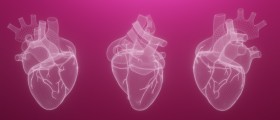Any disease that affects the heart is called heart disease. There are many types of heart disease and some of them can be fatal. One can be born with heart disease or develop it over time. Smoking, unhealthy diet and lack of physical activity are the main risk factors for developing heart disease. These diseases must be recognized early and treated, to prevent serious consequences.

Atherosclerosis
Atherosclerosis is a cardiovascular disease that occurs when fatty material collects inside the arteries. This fatty material builds up along the walls of arteries which become narrow and stiff thus, can limit the blood flow. Ultimately, this can stop the flow of blood to the brain, heart and other organs. Insufficient oxygen and nutrients supply damages organs and they die. If the brain is affected by the disease, a stroke may occur. Heart attack can be result of a blocked artery to the heart.
The condition usually begins in childhood and progresses over years.
Angina
Coronary artery disease develops when excessive amounts of plaque, deposits in the coronary arteries, which supply the heart with oxygen-rich blood, due to atherosclerosis. This condition can be asymptomatic, but sometimes can lead to angina pectoris (chest pain). Angina pectoris is associated with symptoms such as shortness of breath, chest pressure and localized pain below the breastbone. The symptoms occur with physical exertion and can be relieved with rest or angina medicine.
Heart AttackHeart attack, or myocardial infraction, occurs when the heart is deprived of oxygen from blood due to blocked artery to the organ. Heart attack is usually a result of coronary artery disease and leading cause of death worldwide. Symptoms of a heart attack are chest pain and discomfort, dizziness, sweating, nausea and shortness of breath. Heart attacks require immediate medical help. They can be treated with medications, surgery or physical therapy.
Congestive Heart FailureThis type of heart disease develops due to prolonged hypertension, heart attack and other heart diseases. The condition occurs when the heart is not pumping effectively because it is weak or damaged. Slow blood flow can lead to swelling, mostly in the ankles and legs. Congestive heart failure may also affect functioning of the kidneys or cause accumulation of fluid in the lungs.
Arrhythmia
This type of heart disease is characterized by abnormal heart beat. Arrhythmia causes the heart to pump blood less effectively. There are two types of the disease: ventricular and supraventricular.
Rheumatic Heart Disease
This condition is caused by rheumatic fever that causes damage to the heart. Rheumatic heart disease can cause scarring of the heart valves and affect the ability of the heart to pump the blood. The symptoms include: palpitations, fatigue, chest pain and breathlessness.
Myocarditis
Myocarditis is an inflammation or degeneration of the heart muscle due to infection such as polio, influenza, rubella or rheumatic fever. This condition can sometimes progress to more severe heart condition. Myocarditis is associated with symptoms like chest pain, arrhythmia, palpitations, fatigue, chest pain and shortness of breath.

















Your thoughts on this
Loading...